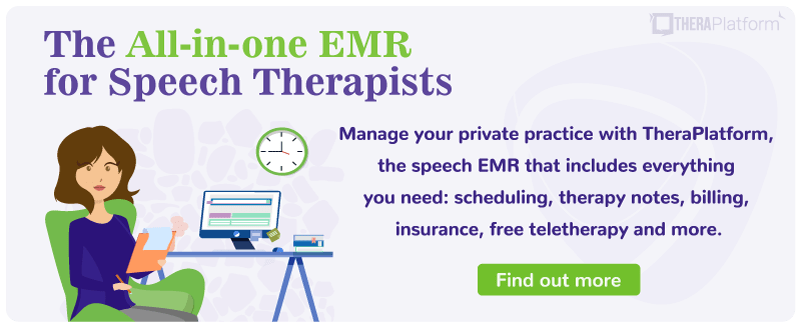Cognitive Communication Disorder

R41.841, the Cognitive Communication Disorder (CCD) ICD 10 code is used for individuals who demonstrate difficulties in areas such as attention, memory, problem solving, and sequencing.
A Cognitive Communication Disorder (CCD) can be defined as deficits in communication skills that occur as a result of underlying deficits in cognition. A CCD can be acquired or congenital.
→ Click here to enroll in our free on-demand Insurance Billing for Therapists video course [Enroll Now]
Individuals may have difficulty with communication skills such as verbal expression, auditory comprehension, and social communication. This can be caused by impairments in information processing, executive-functions, self regulation, and other cognitive skills.
Cognitive Communication Disorders can result from conditions such as traumatic brain injury (TBI), stroke, Alzheimer’s disease, and developmental disorders such as Down Syndrome.
Speech therapy is a critical component of managing CCD. Speech therapists can help individuals improve their communication abilities through the use of specialized techniques. These techniques can improve the individual’s overall quality of life by addressing the cognitive and communication difficulties associated with the Cognitive Communication Disorder.
Follow along as we explore Cognitive Communication Disorders and discuss the key points that Speech-Language Pathologists need to know.

What is a Cognitive Communication Disorder?
Several complex cognitive processes are involved in communication. These include attention, memory, language processing, and executive function. Impairments in these areas can result in a Cognitive Communication Disorder (CCD).
Common impairments associated with CCD include difficulties in recalling information, sustaining attention, organizing thoughts to communicate, planning and executing tasks, and the understanding and use of language appropriately.
Having a Cognitive Communication Disorder can impact an individual’s ability to functionally communicate with others, show appropriate social interaction, participate in activities of daily living, and complete academic tasks.
What is diagnosis R41-841?
The ICD-10 code for Cognitive Communication Disorder is R41.841 and it is a billable code. Speech-language pathologists should use R41.841 when appropriate in documentation such as treatment notes and evaluations.
It is critical for speech therapists to document accurate diagnoses and coding. The International Classification of Diseases, 10th edition (ICD-10) is the official coding system created by the CDC. ICD-10 codes, like R41.841, match specific diagnoses, and are used when completing documentation such as evaluations and treatment notes. This helps ensure consistency among different health professionals.
Documenting the appropriate ICD-10 Code for Cognitive Communication Disorder, R41.841, can help SLPs ensure there is accurate communication among other professionals and can help prevent denials for reimbursement from insurance. Using the most accurate ICD-10 code like R41.841 in documentation also assists healthcare professionals in selecting appropriate treatment interventions to use.
Assessment of Cognitive Communication Disorders
An assessment of CCD typically involves a comprehensive evaluation of cognitive and language skills. This may include the use of standardized tests, interviews and a case history review, clinical observation, and informal assessment measures.
A comprehensive evaluation of the individual’s cognitive-linguistic skills should include an observation and description of the individual’s ability to apply skills such as:
- Attend to, perceive, organize, and remember verbal and nonverbal information
- Use problem solving and reasoning skills
- Initiate and inhibit
- Self-monitor and self-evaluate
ASHA’s preferred practice patterns for CCD states that the SLP may serve as a member of a collaborative team in the assessment. The team can include family/caregivers, the individual, and other relevant professionals, such as educators and medical personnel (i.e., Psychologists, Occupational Therapists, and others).
Treatment approaches for Cognitive Communication Disorders
Therapy goals are individualized to address the specific cognitive-communication deficits that have been identified during the assessment. Intervention may address areas such as:
- Using compensatory cognitive and communication strategies (such as using a calendar or note taking)
- Processing information (e.g., improving the ability to recall verbal and nonverbal information, solve problems, and attend to or organize information)
- Modifying cognitive and communication demands across settings (e.g., providing recommendations for changes to the home or classroom environment to help the client functionally participate despite cognitive-communication challenges)
Start My Free Trial
Start My Free Trial
Incorporating technology in therapy
Technology plays a critical role in the assessment and treatment of CCD. Tools, apps, and software that are designed to improve cognitive and communication skills can be used to help clients improve their abilities in these areas.
Apps that specifically target attention-training and language skills can be motivating for clients to use within and outside of therapy sessions.
Clients can use memory aids such as digital calendars, alarms, and reminders to help compensate for deficits in cognitive skills such as memory and initiation. Augmentative Alternative Communication (AAC) may also benefit some individuals with CCD.
SLPs should keep certain considerations in mind when selecting and implementing technology in therapy sessions. The individual preferences, abilities, and specific therapy goals for each client should be considered to ensure they align with the client’s needs.
Functional communication training
Speech therapists can use specific strategies for improving a client’s functional communication skills in their daily life. This includes working on processing information within various activities and settings.
Role-playing and simulation exercises can enhance a client’s communication skills by allowing them to practice these skills during realistic scenarios. Clients can then more easily generalize skills across various situations and contexts.
It is important for therapists to collaborate with caregivers and support networks to reinforce therapy outcomes. Therapists can provide training and education in compensatory strategies to use when working with individuals with cognitive-communication difficulties. SLPs may also provide helpful recommendations that can help create supportive environments and promote effective, functional communication.
Start 30-day Free Trial and explore TheraPlatform. HIPAA Compliant Video and Practice Management Software for Therapists.
Cognitive Communication Disorders across the lifespan
SLPs address CCD in both children and adults by tailoring therapy approaches to meet the unique needs of different age groups.
In children, CCD can impact the client’s language development and social interaction skills. The child’s academic performance may also be affected. Early intervention and family involvement is crucial when working with this population.
Addressing cognitive-communication changes in aging adults involves providing intervention to maintain the client’s ability to communicate with others to contribute to their overall quality of life. Stroke, neurodegenerative diseases, and age-related cognitive declines can result in CCD in aging adults.
Ethical and cultural considerations
Ethical guidelines for working with individuals with cognitive communication disorders involve therapists adhering to ethical principles and practicing cultural sensitivity.
SLPs should respect confidentiality and the individual’s autonomy to ensure that therapy practices are inclusive and ethical.
Professional development and resources
Speech therapists have the opportunity to engage in ongoing training opportunities to enhance their knowledge and skills in cognitive communication therapy.
Workshops, conferences, and continuing education courses allow SLPs to stay up to date on current research and best practices.
Cognitive communication disorders (CCD) are characterized by difficulties in communication skills that occur as a result of impairments in cognitive skills. Individuals with CCD may have trouble understanding and using nonverbal and verbal language as a result of challenges in attention, memory, and executive functions.
Speech therapists play a critical role in the assessment, treatment, and support for individuals with CCD. Speech therapy can improve the individual’s communication skills, enhancing their overall quality of life.
Ongoing research, advocacy, and collaboration in the field of cognitive communication disorders are essential. These efforts can help improve treatment outcomes, enhance the understanding of CCD causes and symptoms, and support individuals to maximize their potential.
How EHR and practice management software can save speech therapists time with billing and insurance
EHR with integrated billing software, such as TheraPlatform, offers significant advantages in creating an efficient insurance billing process when it comes to speech therapy. The key is streamlining admin tasks such as creating, sending and tracking medical claims through features such as automation and batching.
What are automation and batching?
- Invoices: Create multiple invoices for multiple clients with a click or two of a button or set up auto-invoice creation, and the software will automatically create invoices for you at the preferred time. You can even have the system automatically send invoices to your clients.
- Credit card processing: Charge multiple clients with a click of a button or set up auto credit card billing, and the billing software will automatically charge the card (easier than swiping!)
- Email payment reminders: Never manually send another reminder email for payment again, or skip this altogether by enabling auto credit card charges.
- Automated claim creation and submission: Batch multiple claims with one button click or turn auto claim creation and submission on.
- Live claim validation: The system reviews each claim to catch any human errors before submission, saving you time and reducing rejected claims.
- Automated payment posting: Streamline posting procedures for paid medical claims with ERA. When insurance offers ERA, all their payments will post automatically on TheraPlatform's EHR.
- Tracking: Track payment and profits, including aging invoices, overdue invoices, transactions, billed services, service providers.

Resources
TheraPlatform is an all-in-one EHR, practice management, and teletherapy software built for therapists to help them save time on admin tasks. It offers a 30-day risk-free trial with no credit card required and supports different industries and sizes of practices, including speech-language pathologists in group and solo practices.
More resources
- Therapy resources and worksheets
- Therapy private practice courses
- Ultimate teletherapy ebook
- The Ultimate Insurance Billing Guide for Therapists
- The Ultimate Guide to Starting a Private Therapy Practice
Free video classes
- Free on-demand insurance billing for therapist course
- Free mini video lessons to enhance your private practice
- 9 Admin tasks to automate in your private practice
References
Buckingham, S.S.C. (2011). Cognitive-Communication Disorder. In: Kreutzer, J.S., DeLuca, J., Caplan, B. (eds) Encyclopedia of Clinical Neuropsychology. Springer, New York, NY. https://doi.org/10.1007/978-0-387-79948-3_872
Lanzi, A. M., Saylor, A. K., & Cohen, M. L. (2022). Survey results of speech-language pathologists working with cognitive-communication disorders: Improving practices for mild cognitive impairment and early-stage dementia from Alzheimer's disease. American Journal of Speech-Language Pathology, 31(4), 1653-1671. DOI: Survey Results of Speech-Language Pathologists Working With Cognitive-Communication Disorders: Improving Practices for Mild Cognitive Impairment and Early-Stage Dementia From Alzheimer's Disease
MacDonald, S., & Shumway, E. (2024). Optimizing our evidence map for cognitive–communication interventions: how it can guide us to better outcomes for adults living with acquired brain injury. International Journal of Language & Communication Disorders, 59(2), 623-647. DOI: Optimizing our evidence map for cognitive–communication interventions: How it can guide us to better outcomes for adults living with acquired brain injury



